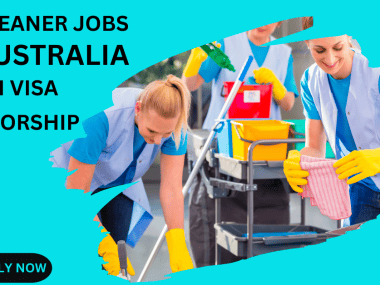Looking for factory jobs in Australia with visa sponsorship? The manufacturing sector is booming, offering numerous opportunities for skilled and unskilled workers. With visa sponsorship options, foreigners can explore factory roles across various industries.
This guide covers the eligibility for factory jobs in Australia, highlights top manufacturing companies offering visa sponsorship, and provides application links to get you started today.
Eligibility Criteria and Requirements for Factory Jobs in Australia with Visa Sponsorship
You must meet several criteria to be eligible for factory jobs in Australia with visa sponsorship:
- Relevant Work Experience: Applicants should have hands-on experience in factory settings. Specific experience related to the industry of the employer may be an advantage. Employers typically look for candidates who can demonstrate practical skills in factory operations.
- Qualifications: For skilled roles, a formal qualification in manufacturing, engineering, or another relevant trade is often required. Vocational education and training (VET) certifications or trade qualifications may be necessary. Unskilled roles may not require formal qualifications, but some relevant experience or training is beneficial.
- English Language Proficiency: Applicants must prove their ability to communicate effectively in English, essential for workplace safety and communication. The IELTS (International English Language Testing System) score requirement typically ranges from 4.5 to 5.0 for factory workers, depending on the visa type.
- Health and Character Requirements: Applicants must meet health requirements, including a medical examination, to ensure they are fit and not a health risk. Police clearances from your home country and any other countries you have lived in for 12 months or more in the last 10 years are required to meet character requirements.
- Visa Options: The Temporary Skill Shortage (TSS) 482 visa is commonly used for factory job roles, particularly for positions with a shortage of local workers. Alternatively, the Skilled Independent Visa (subclass 189) is an option for skilled workers who do not require employer sponsorship, though it is more competitive.
- Employer-Sponsored Visa: Most factory jobs require employers to sponsor the visa application. The employer must demonstrate a genuine need for the foreign worker and prove that no qualified Australian workers are available for the position.
- Age Requirements: Depending on the visa, there may be age restrictions. For instance, applicants for the Temporary Skill Shortage (TSS) 482 visa generally need to be under 45 years old, although some exceptions may apply depending on the occupation or employer.
- Regional and State Requirements: In some cases, factory jobs may be located in regional areas or specific states in Australia. If you are willing to work in regional locations, you may benefit from additional points toward your visa application, such as under the Regional Sponsored Migration Scheme (RSMS).
How to Find and Apply for Factory Jobs in Australia with Visa Sponsorship as a Foreigner
Here’s a step-by-step guide:
Step 1: Research the Job Market and Identify Opportunities
Start by researching the Australian job market to find factory positions that offer visa sponsorship.
Popular job search websites include Seek, Indeed, JobActive, and LinkedIn. Look for positions in industries like manufacturing, food processing, textiles, and machinery operation, as these sectors often require foreign workers.
You can visit the websites of large employers in the manufacturing sector to check for job openings.
Step 2: Understand the Visa Requirements and Eligibility
Once you’ve identified a job, check if the employer offers visa sponsorship for foreign workers. Typically, this would involve the Temporary Skill Shortage (TSS) 482 visa or a Skilled Independent Visa (subclass 189).
Review the eligibility criteria for these visas, such as relevant work experience, qualifications, and English language proficiency. Make sure you meet the requirements before applying.
Step 3: Tailor Your Resume and Cover Letter
Update your resume to reflect your relevant work experience in factory or manufacturing roles. Highlight your skills, certifications, and any specific qualifications related to the job you’re applying for.
Write a tailored cover letter that explains why you are a good fit for the role and how your background aligns with the employer’s needs. Mention your interest in securing visa sponsorship.
Step 4: Apply for the Job
Submit your application through the job portal or company website, following the employer’s instructions. Ensure that your resume and cover letter are well-organized and professional.
If required, provide additional documentation, such as a copy of your qualification certificates or references from previous employers.
Step 5: Prepare for Interviews
If you are shortlisted, you may be invited for an interview. Be prepared to discuss your work experience, qualifications, and ability to meet visa requirements. Ensure you demonstrate an understanding of the Australian workplace culture and your willingness to relocate.
Step 6: Await Visa Sponsorship Approval
Once the employer decides to hire you, they will initiate the visa sponsorship process. The employer will submit a nomination application to the Australian government, and you will need to apply for the visa once the nomination is approved.
Be prepared to submit documents such as proof of qualifications, work experience, English proficiency test results, and health and character clearances.
Step 7: Complete the Visa Application Process
After receiving the nomination from your employer, you can apply for your visa through the Australian Department of Home Affairs.
Ensure you submit all the required documentation, such as medical exams, police clearances, and biometric data. Your visa will be processed, and you will be notified if additional information is needed.
Once your visa is granted, you can make arrangements to move to Australia and start your new job.
Step 8: Relocate and Start Your Job
After your visa is approved, make travel arrangements to Australia. Upon arrival, familiarize yourself with your new workplace and the local area.
Ensure you have all necessary documents, such as your visa approval and employment contract, on hand when you start your job. Follow any additional regulations or onboarding processes set by your employer to get started successfully.
Top Manufacturing Companies Offering Factory Jobs In Australia With Visa Sponsorship
Several top manufacturing companies in Australia offer factory jobs with visa sponsorship for foreign workers.
Here are the companies:
CSL Limited
CSL Limited is a global biotechnology company and one of the largest employers in Australia’s manufacturing sector, particularly in the life sciences field. They offer factory jobs, particularly in their production plants for vaccines, plasma products, and other biotherapies.
CSL provides visa sponsorship under the Temporary Skill Shortage (TSS) 482 visa for skilled manufacturing workers and technicians.
Eligibility for foreign workers includes relevant qualifications in biotechnology, engineering, or pharmaceutical manufacturing, as well as work experience in these areas.
To apply, visit CSL Careers.
CCEP Australia
CCEP Australia is a leader in the beverage manufacturing industry in Australia, with factories across the country.
The company regularly hires factory workers for positions in bottling, packaging, and distribution. They offer visa sponsorship to foreign workers for roles that require skilled labor, such as machine operators, production supervisors, and quality control experts.
Applicants must demonstrate experience in factory environments, good English proficiency, and, in some cases, certifications in manufacturing or engineering.
To apply, visit the CCEP Australia Jobs page.
BlueScope Steel
BlueScope Steel is a leading global steel manufacturer headquartered in Australia. They provide factory roles in steel production, quality assurance, and machinery operation, offering visa sponsorship for skilled foreign workers.
BlueScope sponsors skilled workers in areas such as welding, machine operation, and steel fabrication, requiring relevant qualifications and experience. Applicants need a recognized trade certification in engineering or manufacturing.
To apply, visit their careers page BlueScope Careers.
Visy Industries
Visy is one of Australia’s largest packaging manufacturers, producing products for the food, beverage, and consumer goods industries. The company regularly hires factory workers for roles in packaging, production, and logistics.
Visy offers visa sponsorship through the TSS 482 visa for skilled factory workers, particularly those with experience in packaging machinery and production lines.
Applicants should have a technical background, experience in factory environments, and proficiency in English.
To apply, visit Visy Careers.
Lendlease
Lendlease is a leading global property and infrastructure group in Australia, with a strong presence in construction and manufacturing.
They frequently hire factory workers for roles in construction manufacturing, including precast concrete production, materials management, and machinery operation.
Lendlease offers visa sponsorship for skilled factory workers with qualifications in engineering, construction, or materials management. Foreign workers should have practical experience in large-scale manufacturing operations.
For more information and to apply, visit the Lendlease Careers page.
Boral
Boral is a leading Australian construction materials supplier and a major player in the manufacturing of concrete, cement, and other building materials. They hire workers for factory roles in concrete production, materials processing, and quality control.
Boral offers visa sponsorship under the TSS 482 visa for skilled laborers with experience in construction and manufacturing environments.
Applicants should have relevant trade qualifications or work experience in the building materials industry.
To apply, visit Boral Careers.
Incitec Pivot
Incitec Pivot is one of Australia’s largest producers of industrial chemicals and fertilizers, with significant manufacturing operations. They offer visa sponsorship for factory jobs in production, chemical engineering, quality control, and packaging.
The company typically hires foreign workers with technical qualifications and hands-on experience in chemical or industrial manufacturing.
Applicants should have certifications in chemical engineering or production management, along with English language proficiency.
To apply, visit Incitec Pivot Careers.
Simplot Australia
Simplot is a leading food manufacturer in Australia, producing a wide range of products, including frozen foods, snacks, and ready-to-eat meals. They offer factory jobs in food production, quality control, and packaging, and provide visa sponsorship for foreign workers.
Candidates should have a background in food processing or quality assurance along with experience in a factory environment.
To apply, visit Simplot Careers.
Teys Australia
Teys is one of Australia’s largest beef processors and manufacturers, offering a range of roles in meat production, packaging, and logistics. The company offers visa sponsorship to foreign workers for skilled factory positions in food manufacturing.
Workers with qualifications in food safety, quality control, or meat processing are often sought. Applicants must also meet the company’s health and safety standards.
To apply, visit Teys Careers.
Toyota Australia
Toyota is a global automotive manufacturer with a significant presence in Australia, offering factory jobs in vehicle assembly, parts manufacturing, and logistics.
The company offers visa sponsorship for foreign workers in automotive manufacturing roles, especially those with experience in machinery operation, robotics, and quality control. Applicants should have relevant qualifications in mechanical engineering, manufacturing, or robotics.
To apply, visit Toyota Australia Careers.
The Average Salary for Factory Jobs in Australia with Visa Sponsorship
The average salary for factory jobs in Australia with visa sponsorship varies across different categories such as employment type, experience level, industry, city, and state.
Below is a breakdown of salary expectations based on these factors:
National Average Salary for Factory Jobs
- Hourly Wage: Factory workers in Australia typically earn between AUD 25 and AUD 35 per hour, depending on their skill level and experience.
- Annual Salary: The annual salary ranges from AUD 50,000 to AUD 70,000 for factory workers, with variation based on experience, role, and location.
By City and State
- Sydney (NSW): In major cities like Sydney, factory workers can earn around AUD 60,000 to AUD 75,000 annually. Due to the higher cost of living, wages in Sydney tend to be slightly higher compared to other regions.
- Melbourne (VIC): In Melbourne, factory workers typically earn between AUD 55,000 and AUD 70,000 per year. Victoria also offers significant opportunities in the manufacturing and food processing industries.
- Brisbane (QLD): In Queensland, particularly in Brisbane, factory jobs offer a salary range of AUD 55,000 to AUD 65,000 annually.
- Perth (WA): Factory workers in Perth can expect to earn between AUD 60,000 and AUD 80,000 annually, especially in the mining and manufacturing sectors.
- Adelaide (SA): Factory salaries in Adelaide are generally around AUD 50,000 to AUD 65,000 per year, with a focus on manufacturing and food production industries.
- Tasmania and Regional Areas: In rural regions and Tasmania, salaries can be slightly lower, with factory workers earning between AUD 45,000 and AUD 60,000 annually.
By Experience Level
- Entry-Level Factory Jobs: For those starting in the factory industry, the salary ranges from AUD 45,000 to AUD 55,000 per year or AUD 22 to AUD 25 per hour. These roles typically involve machine operation, assembly line work, and basic production tasks.
- Mid-Level Factory Jobs: For those with several years of experience (3-5 years), the salary range increases from AUD 55,000 to AUD 70,000 annually, or about AUD 25 to AUD 35 per hour. These roles may involve supervisory duties, technical expertise, or quality control responsibilities.
- Experienced/Senior Factory Roles: Experienced factory workers or supervisors can earn between AUD 70,000 and AUD 90,000 annually or AUD 35 to AUD 45 per hour, depending on their expertise in areas such as machinery operation, production management, or safety compliance.
By Employment Type
- Full-Time Factory Jobs: Full-time factory workers tend to earn higher wages, with salaries typically in the range of AUD 55,000 to AUD 75,000 per year.
- Part-Time Factory Jobs: Part-time workers in factory jobs usually earn AUD 25 to AUD 30 per hour, translating to an annual income of around AUD 40,000 to AUD 50,000, depending on the number of hours worked.
- Casual Factory Jobs: Casual workers, who may receive higher pay rates due to lack of benefits (like paid leave), can earn around AUD 30 to AUD 40 per hour.
By Industry
- Food Manufacturing: Factory workers in food manufacturing, such as in meat processing, dairy production, or packaging, can expect to earn between AUD 50,000 to AUD 65,000 annually, with roles in packaging or machinery operation often leading to higher wages.
- Automotive Manufacturing: In the automotive industry, factory workers can earn between AUD 60,000 to AUD 80,000 annually, depending on their roles in assembly lines or vehicle production.
- Textile Manufacturing: Factory workers in the textile industry typically earn AUD 50,000 to AUD 60,000 annually, with experience in machine operation or quality assurance leading to higher wages.
- Chemicals and Pharmaceuticals: Workers in chemical and pharmaceutical manufacturing roles can earn higher salaries, ranging from AUD 65,000 to AUD 85,000 annually, due to the specialized nature of the work.
By Division
- Machine Operators: For skilled machine operators in factory settings, the salary is typically AUD 55,000 to AUD 75,000 per year or AUD 25 to AUD 35 per hour.
- Production Supervisors: Supervisors or team leads in factories can earn AUD 70,000 to AUD 90,000 annually, with roles involving coordination, quality assurance, and inventory management.
- Quality Control Workers: Quality control inspectors in manufacturing settings can expect to earn between AUD 60,000 and AUD 75,000 annually, with a strong focus on maintaining product standards and safety protocols.
Additional Factors
- Overtime and Shift Work: Many factory jobs in Australia, especially in industries like food production and mining, may offer overtime pay or shift allowances, which can increase the salary by an additional AUD 10,000 to AUD 15,000 annually, depending on the industry and work schedule.
Benefits of Factory Jobs In Australia With Visa Sponsorship
Here are the benefits:
Pathway to Permanent Residency
Factory jobs in Australia with visa sponsorship can offer a valuable pathway to permanent residency. If you qualify for a skilled migration visa (such as the Subclass 186 or Subclass 482 visa), you can live and work in Australia long-term.
After working for a few years, foreign workers may also be eligible to apply for permanent residency, allowing for more stability and access to government services.
Competitive Salary and Benefits
Factory jobs in Australia often come with competitive wages and additional benefits. On top of the base salary, you may receive bonuses, overtime pay, and allowances for shift work or hazardous duties.
Many employers also offer comprehensive benefits packages, including health insurance, retirement plans, paid annual leave, and sick leave. These perks help to improve your quality of life while working in Australia.
Skill Development and Career Growth
Australia’s diverse and advanced manufacturing sector offers opportunities for skill development.
Working in Australian factories can provide exposure to cutting-edge technologies, including automation, robotics, and advanced manufacturing processes. This allows foreign workers to gain valuable experience and enhance their skill sets.
Many workers also have opportunities to advance to supervisory or managerial positions as they gain experience.
High Job Demand and Security
Factory jobs in Australia are in high demand, especially in industries like food manufacturing, automotive, and construction materials.
Many Australian manufacturing companies face labor shortages and are eager to hire skilled workers. This demand creates job security for foreign workers, as long as they meet the required skills and qualifications.
Once you are employed, your job stability is reinforced by the ongoing need for factory labor across Australia.
Exposure to a Diverse Work Environment
Australia is a multicultural country, and its factories typically employ people from diverse backgrounds. This allows foreign workers to interact with people from various cultures and learn from different perspectives.
This can be a rewarding experience both professionally and personally, as you adapt to new working environments and develop interpersonal skills in a global context.
Access to Healthcare and Other Services
As a visa holder working in Australia, you’ll be eligible for Medicare, the country’s public healthcare system, once you fulfill the residency requirements. This provides access to affordable healthcare, a significant benefit for workers.
Additionally, you can enjoy the high standard of living in Australia, including access to public services, education, and social support systems.
Work-Life Balance and Employee Wellbeing
Australian employers prioritize work-life balance and employee wellbeing. Many factory workers enjoy structured working hours, with weekends off and overtime paid at a higher rate.
Depending on the company, employees may also have access to wellness programs, gym memberships, and mental health support services, which enhance their overall well-being. This balance contributes to higher job satisfaction and quality of life.
Opportunities to Experience Australia’s Natural Beauty
Factory workers in Australia can enjoy the country’s stunning natural beauty during their time off. With its beaches, forests, mountains, and national parks, Australia offers plenty of opportunities for outdoor activities like hiking, swimming, and exploring.
Workers are encouraged to take time off for personal enjoyment and relaxation, promoting a healthy lifestyle and a strong work-life balance.
Reliable Job Benefits for Families
Factory jobs with visa sponsorship in Australia often offer opportunities for dependents of foreign workers to accompany them on temporary or permanent visas. This ensures that workers can provide for their families while gaining a foothold in the Australian labor market.
As a worker on a sponsored visa, your family can also benefit from access to healthcare, education, and other public services.
Path to Citizenship
If you’re interested in staying in Australia for the long term, working in a factory with visa sponsorship can eventually help you become an Australian citizen.
After living in the country for several years and meeting residency requirements, foreign workers on permanent visas may apply for citizenship, gaining full rights and the ability to vote, own property, and access other government benefits.
Frequently Asked Questions
What is the average salary for factory workers in Australia?
The average salary for factory workers in Australia varies depending on the industry, location, and experience. On average, factory workers earn around AUD 55,000 to AUD 65,000 annually. Hourly rates typically range from AUD 20 to AUD 30, with overtime and shift penalties increasing earnings.
Do all factory jobs offer visa sponsorship?
Not all factory jobs offer visa sponsorship in Australia. Some companies may hire foreign workers directly, but visa sponsorship depends on the employer’s needs and the candidate’s qualifications. Typically, skilled workers in industries with labor shortages, such as manufacturing, are more likely to receive sponsorship offers.
Is experience mandatory for factory jobs in Australia?
Experience is often preferred for factory jobs in Australia, especially for specialized roles like machine operators or supervisors. However, entry-level positions may be available for those without prior experience, especially if they are willing to undergo on-the-job training.
What qualifications do I need to be a factory worker in Australia?
Most factory workers in Australia need a high school diploma or equivalent. For specific roles, additional qualifications such as a Certificate III in Manufacturing Technology or similar trade certifications might be required. Experience and proficiency in operating machinery or safety protocols can be an advantage.
Can I get a visa to Australia as a factory worker?
Yes, foreign workers can obtain a visa to work in Australia as a factory worker. The most common visas are the Temporary Skill Shortage (TSS) Visa (482) or the Skilled Independent Visa (189), both of which allow foreign workers to live and work in Australia if they meet the required qualifications and experience.
What is the age limit for factory workers in Australia?
There is no official age limit for factory workers in Australia. However, most companies prefer workers between the ages of 18 and 45 for physical roles due to the nature of the work. Age may not be a barrier if the applicant is capable of meeting the job requirements.
Can factory workers apply for permanent residency in Australia?
Yes, factory workers can apply for permanent residency in Australia, especially if they are sponsored through a Skilled Migration Visa or the Temporary Skill Shortage (TSS) Visa. After working in Australia for a few years, foreign workers may be eligible to apply for permanent residency through the skilled migration program.
Are factory jobs available across Australia?
Yes, factory jobs are available across Australia, particularly in manufacturing hubs such as New South Wales, Victoria, and Queensland. Larger cities like Sydney, Melbourne, and Brisbane have a higher concentration of factory jobs, but opportunities can also be found in regional areas where manufacturing is a key industry.
Which states in Australia need foreign factory workers the most?
States like New South Wales, Victoria, and Queensland typically have the highest demand for foreign factory workers due to their larger manufacturing sectors. South Australia and Western Australia also have significant needs for workers in food processing and heavy manufacturing industries.
How long does it take to get a factory job visa in Australia?
The time it takes to get a factory job visa in Australia can vary. On average, the visa processing time for a Temporary Skill Shortage (TSS) Visa (482) is about 1 to 3 months, depending on the complexity of the application and whether the applicant has all the necessary documents.





